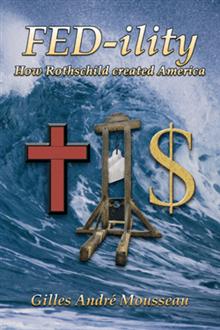The term conspiracy could best be defined as a line of thought that goes against the official and accepted interpretations of academia. It could also be said that in this age of mass communication censure is built-in. There are a lot of nuts expounding extravagant theories and it’s very natural for most people to want to counter them. In fact, the three news agencies, Reuters, AFP, and AP, are happy to air those outside-the-box theories, accurate or not, because they automatically all go in the same bag, the one called conspiracy. Although books are no longer burned on the public square, censure is indeed alive and well.
Analyzing the why’s of history doesn’t constitute conspiracy. It’s ludicrous to think that my blog and book are conspiratorial, for I think that Mayer Amschel Rothschild is the greatest man that ever lived. We should all be grateful to the FED, and that’s the truth of it.
What’s wrong with knowing that Rothschild brokered the Soldiers-for-America deal for Prince William of Hesse? What’s wrong with knowing that he had to have an agent, and that his name was Haym Salomon? Why shouldn’t we know that Haym was sentenced to hang by the English because he abetted the Patriots? Does denying the fact that Haym financed George Washington, Alexander Hamilton, the Patriots and the whole war effort as well as the politicians in Philadelphia mean that he didn’t? Why should we not believe that Haym brokered the French Aid Package in 1768, and that he had enough gold to finance Robert Morris and Alexander Hamilton and create the Bank of North America in 1781? All those facts are known and available for scrutiny. If we can’t make the connection between Rothschild and the first commercial bank of the USA, the Bank of North America, it’s because we refuse to do so, and that’s self-censure.
